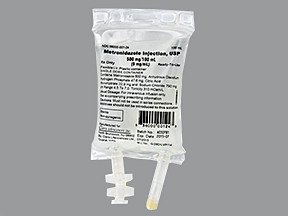METRONIDAZOLE - INJECTION
PHONETIC PRONUNCIATION: (MET-roe-NID-a-zole)
COMMON BRAND NAME(S): Flagyl, Metro
GENERIC NAME(S): metronidazole in sodium chloride
Uses
USES: Metronidazole is an antibiotic that is used to treat a wide variety of infections. It may also be used to prevent infection after bowel surgery. It works by stopping the growth of certain bacteria and parasites.
How to use METRONIDAZOLE - INJECTION
HOW TO USE: This medication is given by injection into a vein as directed by your doctor, usually 3 or 4 times a day. It is injected slowly into a vein over 1 hour. The dosage is based on your medical condition and response to treatment. If you are using this medication at home, learn all preparation and usage instructions from your health care professional. Before using, check this product visually for particles or discoloration. If either is present, do not use the liquid. Learn how to store and discard medical supplies safely. For the best effect, use this antibiotic at evenly spaced times. To help you remember, use this medication at the same time(s) every day. Continue to use this medication for the full time prescribed, even if symptoms disappear after a few days. Stopping the medication too early may result in a return of the infection. Tell your doctor if your condition lasts or gets worse.
Side Effects
Precautions
Interactions
Overdose
Images
Reviews
Disclaimer
IMPORTANT: HOW TO USE THIS INFORMATION: This is a summary and does NOT have all possible information about this product. This information does not assure that this product is safe, effective, or appropriate for you. This information is not individual medical advice and does not substitute for the advice of your health care professional. Always ask your health care professional for complete information about this product and your specific health needs.


No Reviews Yet